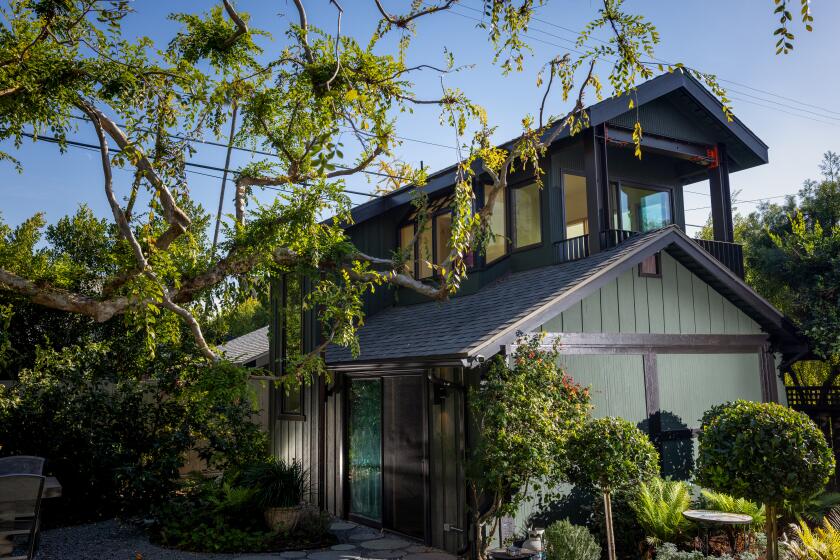30-Year Plan for Hollywood Takes First Official Step
Hollywood’s long-anticipated revitalization took its first official step forward Monday as the city’s Community Redevelopment Agency approved the first draft of an ambitious 30-year building program to change the face of the film industry’s blighted birthplace.
The agency’s board voted unanimously to send the redevelopment plan to the Los Angeles Planning Commission for review after two years of work by agency planners and a citizen advisory panel. The agency also voted to begin seeking tax increment financing from local, state and federal sources.
“Hollywood will finally be given the attention it deserves,” said agency board chairman James Wood before the vote was taken.
The project, expected to cost between $572 million and $920 million by the time it is completed, would transform a 1,100-acre redevelopment district into an entertainment and tourist center. The redevelopment agency envisions 2.65 million square feet of office space, 1,600 hotel rooms, 2,800 housing units, 4,500 new parking spaces and 20 acres of parks in the district in 30 years.
More Changes Likely
But reservations about development permitted by the plan and its impact on historic structures, expressed at the board meeting by city Planning Director Calvin Hamilton, indicated that the proposal will probably undergo more changes before it reaches the City Council next spring.
Significant alterations were, in fact, made in the plan’s wording just days before the hearing after meetings between Planning Department and redevelopment agency officials. And the two city agencies have said they will meet in coming weeks to iron out other disputes.
“There are still some strong differences in opinion,” Hamilton said after the board meeting.
The two agencies have sparred over the plan’s contents in recent months. In one dispute, Michael Woo, 13th District councilman, sided with Hamilton and Hollywood Hills residents in their efforts to restrict new apartment house developments along Hollywood’s northern edge, on Franklin Avenue.
The Planning Department won another concession in recent weeks when the redevelopment agency agreed to ensure that its plan would be consistent with pending revisions to the Hollywood Community Plan. Under those revisions, which still require City Council approval, major commercial development in central Hollywood would be restricted to areas adjacent to planned Metro Rail stops and adequate public transportation.
The redevelopment agency also agreed to allow the Planning Department and the city Department of Transportation to monitor development in the commercial core. Earlier, the agency had insisted that it do the monitoring.
Opposing Views
But the two agencies still have opposing views on parts of the plan that affect the extent of development in the commercial core and the ability to preserve historic buildings there.
In one important difference, the redevelopment agency and its citizen advisory board, the Project Area Committee, would allow developers to exceed the commercial core’s 4.5-1 floor area ratio (4.5 square feet of building for every one square foot of land) if developers satisfied one of four “mitigating” requirements: concentrating development in areas near public transportation, providing development that is architecturally compatible with nearby historic buildings, providing entertainment or tourist-related facilities or providing housing for low- or moderate-income families.
But Hamilton is insisting that any developer who wants to build more than the 4.5-1 floor-area ratio must satisfy the transportation requirement and at least one other mitigating requirement.
“We feel there are just not enough mitigating measures to control development on Hollywood Boulevard,” Hamilton said.
Hollywood Boulevard may well become the main battleground between the two agencies when they testify before the city Planning Commission on the redevelopment plan. The hearing is scheduled for Jan. 16.
City Planning Assistant Michael Davies said the Planning Department will ask the commission to insert language that would mandate historic preservation on the boulevard. “We will be making very specific recommendations on preservation before the commission,” Davies said.
At the board meeting, Hollywood civic activists referred to a newly published draft of an environmental impact report that outlines the redevelopment plan’s effects on historic structures in Hollywood. The report concluded that the plan would provide “additional protection for historic properties,” but also threaten at least six historic buildings in Hollywood’s commercial core.
Protections ‘Not Enough’
“Even with the mitigation measures written into the plan, those protections are not enough for many historic buildings on Hollywood Boulevard,” preservationist Frances Offenhauser, a member of the Project Area Committee, said at the board meeting. “Those buildings will come down. That’s what we have to prevent.”
Marshall Caskey, a Hollywood attorney and president of the Project Area Committee, said criticism by Offenhauser and several other activists who testified against various parts of the plan did not reflect the committee’s support of the redevelopment plan.
“There was a strong consensus on almost all issues,” he said. Caskey urged Hamilton and the redevelopment board to resolve as many of their disputes as possible before the Planning Commission hearing “so we won’t have an endless series of changes.”
Caskey and redevelopment agency board members said there was little the agency could do to provide for Hollywood’s myriad social needs. Some civic activists have criticized the plan for not containing any provisions to help the area’s homeless, runaways, single parents and destitute immigrant families.
“In none of these pages is there anything whatsoever for the humanitarian problems of this community,” said Doreet Rotman, a restaurant owner and member of the Project Area Committee.
Inflexibility Feared
But redevelopment agency board member Christopher L. Stewart replied that the agency’s legal authority is narrowed to development and land-use issues. And Caskey said later that a majority on the Project Area Committee felt that any attempt to solve social problems in the plan could make the document inflexible as years passed.
“Most of us were concerned that the (redevelopment) agency’s hands would be tied if we put in specific requirements now to meet a variety of human needs,” Caskey said. “What happens if those needs change?”
The redevelopment plan will be studied by the city Planning Commission, which is expected to deliver its own recommendations on Jan. 23.
More to Read
Only good movies
Get the Indie Focus newsletter, Mark Olsen's weekly guide to the world of cinema.
You may occasionally receive promotional content from the Los Angeles Times.






